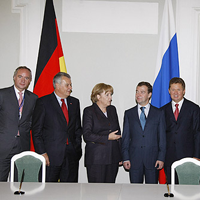On the morning of Jan. 1, 2009, Russia's state-owned gas-export monopoly Gazprom halted natural gas deliveries to Ukraine. Gazprom blamed the disruption on Kiev's refusal to pay its debts on past deliveries and its unwillingness to accept an increase in its gas prices. Although Gazprom continued to transit gas through Ukraine for delivery to other European countries, by Jan. 5, five European Union (EU) member states, including Poland, Hungary and Romania, had announced that they were experiencing gas-supply disruptions. On Jan. 7, Russia shut off all gas deliveries through Ukraine, accusing Kiev of siphoning off gas destined for Europe to meet its own domestic needs. The same day, European heavyweights France and Germany indicated that their gas supplies had been curtailed.
The cutoff rippled through Europe, moving from east to west, as more than a dozen countries endured gas-supply shortfalls. Some states, especially those in Western Europe, were able to meet the supply gap by importing more natural gas from the North Sea, North Africa or the seaborne liquefied natural gas (LNG) market. Others with less-developed gas-supply infrastructures, like Bulgaria, were left to freeze while Moscow and Kiev resolved their differences.
On Jan. 18, after weeks of brinksmanship, finger-pointing and recriminations, the two countries reached an accord on the gas trade; supplies resumed on Jan. 20, nearly three weeks after the initial reduction in flows. Europe was left dumbfounded by the intensity and length of the dispute. The day gas supplies were restored, European Commission President Jose Manuel Barroso signaled his frustration with characteristically diplomatic understatement, saying, "I was very disappointed . . . about the way the leadership in these two countries negotiated. I will not forget that."

